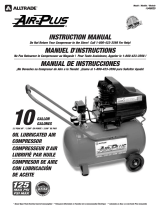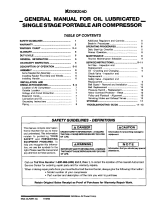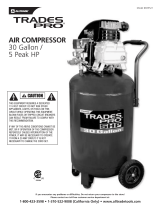Page is loading ...

MODEL NUMBER:
M 20005 – AIR SOURCE KIT
30% Duty Compressor on
2.0 Gallon Air Tank
SAVE THIS MANUAL FOR FUTURE REFERENCE
USER MANUAL
IMPORTANT SAFETY INSTRUCTIONS
CAUTION - To reduce risk of electrical shock or Electrocution:
• Do not disassemble. Do not attempt repairs or modifications. Refer to qualified
service agencies for all service and repairs.
• Do not use this product in or area where it can fall or be pulled into water or other
liquids.
• Do not reach for this product if it has fallen into liquid.
• Use this compressor with 12-volt DC systems only.
• This product should never be left unattended during use.

WARNING - To prevent injuries:
• Never allow children to operate this compressor. Close supervision is necessary
when this compressor is being used near children.
• This compressor will become very hot during and immediately after use. Do not touch
any part of this compressor with bare hands other than the ON/OFF switch during and
immediately after use.
• Do not use this product near flames or explosive materials or where aerosol
products are being used.
• Do not operate this product where oxygen is being administered.
• Do not pump anything other than atmospheric air.
• Never use this product while sleepy or drowsy.
• Do not use any tools or attachments without first determining maximum air pressure
for that tool or attachment.
• Never point any air nozzle or air sprayer toward another person or any part of the
body.
• This air compressor is equipped with an Automatic
Reset Thermal Protector, and can automatically restart after the thermal protector
resets. Always cut off power source when thermal protector becomes activated.
• Wear safety glasses or goggles when operating this product.
• Use only in well ventilated areas.
IMPORTANT:
It is essential that you and any other operator of this product read and understand the
contents of this manual before installing and using this product.
INSTALLATION
Please read and follow the Installation Instruction carefully to avoid injury or
damage to the compressor or your vehicle. Each of our air source kits and parts have
been carefully produced and packaged. Before you begin installation, please
familiarize yourself with
Installation Parts List (Fig. 1) of this manual.
Selecting a Mounting Location:

The selection of a proper mounting location for your air source kit will help ensure a
long and trouble free service life. Please pay close attention to the following
guidelines:
1. Select a FLAT AND SECURE location where the air source kit can be mounted.
2. To maximize air compressor performance, locate compressor as CLOSE TO THE
BATTERY as possible so that length of positive lead wire required is at a minimum.
3. Choose mounting location that is as cool as possible and AWAY FROM HEAT SOURCES.
The cooler the ambient temperature the less chance the compressor will overheat.
4. The compressor is moisture & splash resistant, but NOT WATERPROOF. Do not mount
air source kit in locations where the unit is likely to come in contact with water.
5. If it is necessary to mount the air compressor further away from the battery, such
as inside your vehicle or in the bed of your pickup, use a minimum 8-10 AWG positive lead
wire for remote installation.
6. Do not mount air source kit near areas where flammable liquids are stored.
MOUNTING AND WIRING
1. Disconnect ground cable from vehicle’s battery.
2. Temporarily position the air source kit in the location where it will be mounted.
3. Route ground wire to the negative post of the battery or to an appropriate
grounding point
and cut ground wire to length as needed.
4. Mount air source kit at tank leg mounts with the four grommets, and four sets of
bolts, nuts, washers, and locking washers provided. Use of thread sealant is
recommended.
5. Route air line to the 1/4” compression fitting and make your air line connection.
Tighten compression fitting nut securely using a wrench.
6. Connect ground (Black) wire to a clean ground, (preferably a chassis ground) and
secure with a self-tapping screw.
7. Connect positive (Red) lead wire from preinstalled pressure switch to a fuse holder
(25- amp minimum).

8. Once the kit is properly fused as close as possible to the power source, connect and
test compressor system by running the compressor for a short time to build up pressure
in your air tank.
9. Once air pressure reaches preset cut out pressure of your pressure switch (1100 PSI
cuton,
145 PSI cut-off), the compressor will shut off automatically. Inspect all air line
connections for leaks with soap and water solution. If a leak is detected, the air line
may not be cut squarely or pushed all the way in. Tighten connections if needed.
AIR TANK PRECAUTIONS
IMPORTANT:
a. The air source kit air tank is rated for 150 PSI maximum working pressure. Do not
overfill. Overfilling may result in death or serious injury.
b. Tank is not to be used as a breathing device.
c. Always wear ANSI approved safety glasses when operating air tank.
d. Bleed pressure from tank after each use, and before servicing or adding
attachments.
e. Use only attachments or tools rated for 150 PSI working pressure or less.
DRAIN TANK OFTEN TO REMOVE CONDENSATE. FAILURE TO DRAIN TANK WILL ALLOW
TANK TO RUST INTERNALLY.
a. To remove any accumulated condensation inside the tank, bleed pressure from tank
until pressure is approximately 5 PSI to 20 PSI.
b. Drain water from tank by opening the drain cock drain valve.
c . If drain cock is plugged, release all air pressure from tank, remove drain valve and
clean, then reinstall.
d. After condensate has been drained, close the drain cock.
IMPORTANT: Observe air tank Date of Manufacture (stamped on tank leg). Replace air
tank 2 to 5 years from date air tank was first used, or use the date of manufacture as
reference. Your adherence to air tank draining guidelines will determine the
replacement date of your air tank. RUSTED TANKS CAN FAIL
CAUSING EXPLOSIONS OR FATAL INJURIES. Discard tank immediately if tank is rusted.

NOTE: When using a safety pressure relief valve, point the safety pressure relief valve
away from your body. Use the pull ring on the safety relief valve; open the relief
valve to vent any pressure inside the tank before attempting to service tank.
OPERATING INSTRUCTIONS
1. IMPORTANT: Always operate the compressor BELOW the MAXIMUM PRESSURE RATING
of the compressor. Please refer to Application & Specifications Sections of this manual
for details.
2. Always observe the MAXIMUM DUTY CYCLE of the air compressor. Refer to
Compressor Applications and Specifications Section of this manual for details.
Operation exceeding maximum pressure ratings and or duty cycle will result in damage
to air compressor.
3. Your air compressor is equipped with an AUTOMATIC THERMAL OVERLOAD PROTECTOR.
This feature is designed to protect the air compressor from overheating causing
permanent damage to your air compressor. The thermal overload protector will
automatically cut off power to your air compressor should the internal operating
temperature of the air compressor rise above safe levels during excessive use.
4. Should at any time during use, your air compressor automatically shuts off; do not
attempt to restart air compressor. Turn power switch to the air compressor to the OFF
position.
The automatic thermal overload protector will automatically reset when internal
temperature of the air compressor drops below safe levels. After allowing air
compressor to cool off for about 30 minutes, you can safely resume use of the air
compressor by turning on the air compressor.
5. To prevent discharge of your vehicle’s battery, we strongly recommend that you
keep the vehicle’s engine running while using the air compressor. Compressor
performance is enhanced when operating compressor with vehicle’s engine running.
6. IMPORTANT: ONLY OPERATE THE AIR COMPRESSOR IN WELL-VENTILATED AREAS.
About Compressor Duty Cycle: Compressor Duty Cycle refers to amount of time a
compressor can be operated in a given time period, at 100 PSI and at a standard ambient
temperature of 72°F. Duty
Cycle is commonly expressed in percentile as: Compressor On Time/ (Compressor On Time
+ Off Time)% As an example, a compressor that is rated for 25% duty cycle means that
compressor can be operated at: 100 PSI @ 72°F for 10 minutes ON and 30 minutes OFF ⇓
10 min. On / (10 min. On + 30 min. Off) = 10 min. / 40 min. =25% Duty Cycle
DUTY CYCLE REFERENCE CHART

DUTY CYCLE @100PSI / 72°F
MINUTES ON / OFF
15% 6 Min. On / 34 Min. Off
20% 8 Min. On / 32 Min. Off
25% 10 Min. On / 30 Min. Off
30% 13 Min. On / 30 Min. Off
33% 15 Min. On / 30 Min. Off
100% Continuous Duty
About Rated Working Pressure:
To ensure trouble free service life of your compressor, always operate compressor
within rated working pressure of the compressor. Never use a pressure switch with a
higher cut-off pressure than compressor’s rated working pressure.
COMPRESSOR SPECIFICATIONS
280C Air Compressor
Motor Voltage: 12 Volts
Max. Current Consumption: 16 Amps
Recommended Fuse: 30 Amps
Motor Type: Perm. Magnetic
Horse Power: 1/4
Max. Working Pressure: 150 PSI
Max. Duty Cycle (@72ºF & 100 PSI): 30%
Minutes On/Off (@72ºF & 100 PSI): 13 On / 30 Off
Continuous Use (@72ºF & 40 PSI): 40 Minutes
Max. Restart Pressure: 200 PSI
Max. Ambient Temperature: 158°F
Min. Ambient Temperature: -40°F

Auto. Reset Thermal Protection: Yes
TROUBLESHOOTING CHART
PROBLEM POSSIBLE CAUSE(S) CORRECTIVE ACTION
CAUTION: NEVER DISASSEMBLE COMPRESSOR WHILE COMPRESSOR IS PRESSURIZED.
Tank pressure drops when compressor shuts off Compressor runs continuously and air
flow lower than normal Compressor runs continuously causing safety valve to open.
Excessive moisture in discharge
1. Loose drain cock
2. Check valve leaking
3. Loose connections
1. Excessive air usage
2. Loose connections
3. Worn piston ring or inlet valve
4. Clogged air filter element
1. Faulty pressure switch
2. Defective safety valve
1. Excessive water in air tank
2. High humidity
1. Tighten drain cock
2. Replace check valve or compressor
3. Check all connections with soap and water solution and tighten
1. Decrease air usage
2. Check all connections with soap and water solution and tighten
3. Replace compressor
4. Replace air filter element
1. Replace pressure switch

2. Replace safety valve
1. Drain tank, tilt tank to drain and drain tank more frequently
2. Move compressor to area with less humidity, or use water separator.
TROUBLESHOOTING
PROBLEM POSSIBLE CAUSE(S) CORRECTIVE ACTION
Compressor will not run
Thermal Overload Protector cuts out repeatedly
Excessive knocking or rattling
1. No power, or switch in Off position.
2. Blown Fuse.
3. Motor over heat.
4. Faulty pressure switch (if hooked up to a pressure switch).
1. Lack of proper ventilation/ambient temperature too high.
2. Compressor valves failed.
1. Loose mounting bolts
2. Worn bearing on eccentric or motor shaft
3. Cylinder or piston ring is worn
1. Make sure compressor switch is ON
2. Disconnect compressor from power and replace fuse. (Refer to Specifications
section for correct fuse amperage.)
3. Let compressor cool off for about 30 minutes for thermal overload switch reset.
4. Replace pressure switch
1. Move compressor to well ventilated area, or area with lower ambient temperature
2. Replace compressor
1. Tighten bolts
2. Replace compressor

3. Replace compressor
LIMITED WARRANTY
VIAIR Corporation warrants this product, when properly installed and under normal
conditions of use, to be free from defects in workmanship and materials for a period of
one year from provided date of purchase. To receive a replacement or for repairs,
return the complete unit to retailer from whom it was purchased along with proof of
purchase. Returns should be made within the time period and conditions of the
retailer’s policy for exchanges. If you are unable to contact your dealer, contact
VIAIR directly for repairs or replacement at our option.
PLEASE NOTE: THIS WARRANTY COVERS PRODUCT DEFECTS ONLY; IT DOES NOT COVER
INCIDENTAL OR CONSEQUENTIAL DAMAGES AS RESULT OF MISUSE OR ABUSE.
/



